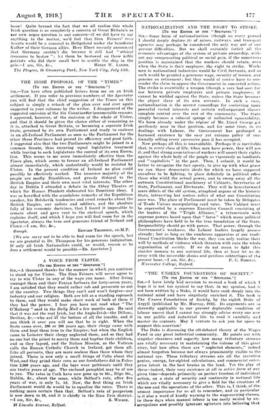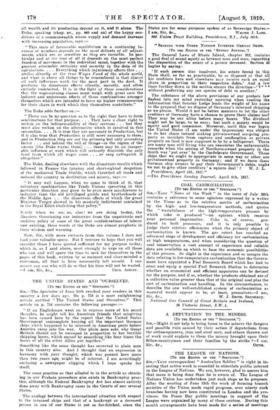"THE UNSEEN FOUNDATIONS OF SOCIETY." (To THE EDITOR OF THE
"SPECTATOR."] SIR,—I have lately had occasion to re-read a book of which I hope it is not too cynical to say that, in my opinion, had it not been written by a Duke, it would have sunk deeply into the national mind and have singularly enriched it. The book is The Unseen Foundations of Society, by the eighth Duke of Argyll (published by Mr. Murray, 1893). Its arguments are so shrewdly applicable to our present deplorable condition of labour unrest that I cannot too strongly advise every one now in our public and industrial life to read it carefully and master its contents. May I venture to ask you for space to support this assertion?
The Duke is discussing the oft-debated theory of the Wages Fund in any great industrial community. He points out with singular clearness and sagacity how many tributary streams are vitally necessary in maintaining the volume of this great river, but how often these are "neglected elements," indeed almost forgotten because not always prominently visible to the national eye. These tributary streams are all the inventive genius, energy, far-sighted calculations, and commercial enterprise latent in the best brains in the land. Yet the play of these—indeed, their very existence at all in active form at any given time—depends primarily on perfect freedom of individual action, on a state of security and continuity in national life which are vitally necessary to give a field for the creations of the one and the operations of the other. This is, I think, of the utmost importance for us all to remember, and in particular is it also a word-of kindly warning to the wage-earning classes, in these days when manual labour is too easily misled by unscrupulous andpossibly ignorant agitators into believing that all wealth and its production depend on it, and it alone. The Duke, speaking (chap. xv., pp. 489 and on) of the happy conditions of a commonwealth where supply and demand increase with increasing population, says:— " This state of favourable equilibrium in a continuing increase of numbers depends on the most delicate of all adjustments, which are as sensitive as they are invisible. In particular and at the root of all it depends on the most perfect freedom of movement in the individual mind, together with the greatest attainable certainty and security in the data of its calculations. . . . Everything which injuriously affects this .. . strikes directly at the true Wages Fund of the whole world, and what is above all things to be remembered is that almost all such influences work for the most part in the dark. It produces its disastrous effects silently, secretly, and often entirely undetected. it is in the light of these considerations that the wage-earning classes must weigh with great care the indirect and unforeseen effects of those combinations amongst themselves which are intended to force up higher remuneration for their share in work which they themselves contribute."
The Duke adds further en :— " There can be no question as to the right they have to form combinations for that purpose. . . . They have a clear right to reckon on the indispensability of their services . . . but they must also reckon on the alternative which is involved in this connection. . . . It is true they are necessary to Production, but it is also true that Production is still more necessary to them; and in Production they are not the primary but only secondary factor . . . and behind the veil of things—in the region of the unseen [the Duke warns them] . . . there may be an insuperable influence at work which will seriously diminish the only fund from which all wages come . . . or mail extinguish, it altogether."
The Duke, dealing elsewhere with the disastrous results which followed in France the tyranny and short-sighted despotism of the mediaeval Trade Guilds, which throttled all trade and reduced the country to destitution and misery, says :— " It may well happen, when we come to think of it, that voluntary combinations like Trade Unions operating in this particular direction may grow to be even more mischievous to industry than the old privileged guilds and brotherhoods of the Middle Ages . . . the disastrous effects of which the great Minister Turgot showed in his masterly indictment contained in the Royal Edict abolishing that policy."
Sorely when we see, as, alas ! we are doing to-day, the disasters threatening our industries from the unpatriotic and reckless policy -of some of the great confedenations of labour now existing, these words of the Duke are almost prophetic in their wisdom and warning.
Now, Sir, with more extracts from this volume I dare not load your valuable space. But I venture to hope that you will consider those I have quoted sufficient for my purpose to-day, which is, as I said above, most strongly to urge on all those who can and will spare the time to seek for themselves in the pages of this book, written by so eminent and clear-minded a statesman, all that is here necessarily left unsaid. I can assure any one who will do so that his time will not be wasted.
—I am, Sir, &c., CECIL ASHLEY.



































 Previous page
Previous page